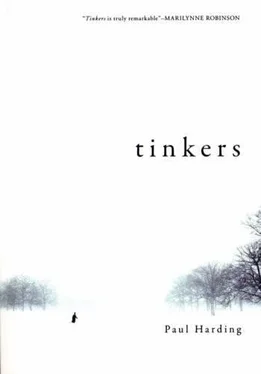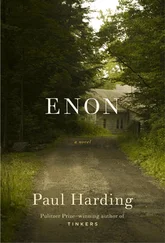Never you mind that, George. It's time to come down and get dinner. Kathleen had come upstairs without George noticing. George started when she spoke, and suddenly his head and his neck and his legs and his arms all ached and he felt feverish. Kathleen saw that he felt a kind of humiliation at being caught reading the pamphlet and at knowing just what it meant, even though it was something he should not even know about. She, too, suddenly suffered the weight of the day and felt cold and hungry and impatient.
My bureau is not yours to dig around, she said. She snatched the brochure from George's hands and shooed him out of her room and toward the stairs. Go get your brother ready to eat and tell your sisters to pour everyone a glass of milk. Go.
Yes, Mum. George stifled an urge to burst into tears. He went downstairs. Kathleen folded the brochure in half and stuffed it into a wool sock, which she tucked under a sweater at the back of her bottom bureau drawer.
That night, Kathleen and the children ate dinner without Howard, who was still not back from his rounds by seven o'clock. Afterward, she took up mending a pair of Joe's overalls in her rocking chair next to the woodstove. Darla and Margie played with two dolls, which they pretended were Susan B. Anthony and Betsy Ross preparing tea for George Washington and Andrew Jackson. Darla hopped Susan B. Anthony over to Betsy Ross, who was already sitting at the table, double-checking the tea service.
Darla made Susan B. Anthony bow to Betsy Ross and say, Happy New Year, Betsy!
Margie stood Besty Ross up and made her curtsy. And happy 192 7 to you, Ms. Anthony!
Darla said, No, Margie, it's 1776.
George sat on the couch, holding a book called Mark the Match Boy open on his lap with his injured hand and an apple in the other. He stared at the print but did not read. He thought about his father, who had bitten him and who was a madman about to be taken to the madhouse. It suddenly occurred to him that his brother, Joe, would be sent to the madhouse, too, sooner or later.
For years, an old bearskin rug of indeterminate origin had been lying in a far corner of the parlor. Sometimes, on cold nights, when the family gathered in the parlor, the children sat on it, pretending that they were riding a bear in a circus. Howard had named the rug Ursula. It was a ragged, mangy thing, with a bald patch running from its snout to between its eye sockets, which either had been pitted of their original glass eyes or simply left empty. The previous winter, George had inserted marbles in the sockets, one a milky green with gold sparkles, the other obsidian black. The black eye made the bear look alive. The milky green eye made her look as if she were half-blind, or as if she had one eye on another world, since the gold sparkles in the green looked like a tiny whirlpool of stars spinning inside a cataract. George took a bite of his apple and watched Joe, who jumped on the rug and pretended he was riding the bear and then rolled off it as if it had bucked him.
Stop that fussing around, Joe, Kathleen said.
Joe sprang up, smiling, and stepped toward George. He pointed back to the rug and said, George, that Ursula looks like she's fixing for to bite me!
George waited until Saturday to run away. He hitched Prince Edward to his father's wagon and led the animal and wagon out to the road, holding the reins tightly and walking right next to the mule and whispering to it, urging it, shushing it. When he was out of sight of the house, he mounted the wagon and snapped the reins and said, Hya, boy, not in the manner of his father, who merely flicked the leather leads and made a clicking sound with his tongue against his back teeth, but of his friend Ray Morrell's father, who talked with a strange accent George had never heard before and would never hear again, and who seemed to have stepped out of some bank of mist on the other side of which was, perfectly preserved-or, not even preserved, but still actual -the previous century. Ray's father Ezra, owned sixteen oxen. When he drove them, he said, Hya, hya, boys or, Work it, ye dogs. Mr. Morrell was the only person George ever knew who used the word ye.
So George said, Hya, boy, and Prince Edward barely noticed and started to walk at a pace a little slower than usual, as if registering his awareness that this was not his usual route, not his usual driver, not his usual cue. The sunny weekend morning, the lackadaisical mule, and the extra heaviness of the slow rate imparted by the bulk of the wagon conspired to dilute George's half notions of speed and flight and pursuit and evasion. In his mind, he, during school the previous days, had seen trees flying by, alternating trunks and light flicking by. He saw hounds baying and scrambling past a thicket of reeds and cat-o'-nine-tails at the edge of water and, after they had passed, the stalks parting and his own head rising half out of the water, alert, sharp, animallike. Now, he inched along in full daylight atop a wagon as big as a house and as noisy as a suitcase full of Turkish cymbals. For the first time, he wondered about what all of those drawers were packed with. He realized that he had formed a vague conception of the wagon's inventory-brushes, mops, pots, pipes, socks, suspenders, polish-a single picture that appeared in his mind whenever he thought about the wagon. It came up like a road sign, a billboard, or an advertisement-simple and all-encompassing and, he now understood, cursory and distorted. He peered over the side of the wagon. I couldn't even say what wood the drawers are made from, he thought.
When the turnoff to his friend Ray Morrell's farm came up, George took it without thinking. He was nearly at the old curing house, now a toolshed, or at least shed for odd planks and hoops and handles and blades of wood and iron for which there was no longer use, each artifact having split or worn out or dulled to the very end of usefulness, so that not even Ray's father, the most frugal farmer in a countryside of frugal and impoverished farmers, could nail it, tie it, or hammer it back into place and eke out one more execution of whatever task the piece of wood or metal was supposed to perform. The curing house was at the end of another turnoff along the dirt tracks that led from the main road (which was dirt as well, this far out of town, but of wellpacked and -tended dirt) to the Morrells'. George had taken both turns without thinking. The curing shed was where he and Ray Morrell went and smoked and played cribbage and told stories and jokes after they had finished working for Ray's father-milking the cow or sweeping the yard or, most often, unyoking and feeding and inspecting Ray's father's giant oxen.
(Ray Morrell already, at twelve years old, had the air of a chaste, fastidious old bachelor, someone who knew about commemorative coins and prevailing winds and who, already, had a taste for the turpentinelike bathtub gin his father always had a bottle of stashed away under the basement stairs. And many years after he had enough money to comfortably buy better, Ray continued to buy the most wretched gin he could find, until his swollen liver gave out. He was pleased to allow people to think that his taste for rotgut was because of thrift born of his childhood dirt-farmer poverty, when, in fact, it was because he was forever soothed by the memories of drinking hooch that could have doubled as paint thinner in the old curing house with dusty blades of sunlight stabbing through the gaps in its wall boards during afternoons after school with his best friend in the world, George Washington Crosby.)
Ezra was known throughout the county and beyond as the man to call when you needed something big pulled. This was the source of many crude jokes. The smallest of his oxen stood at just under six feet at the shoulders; the tallest, over seven and a half. The oxen were one of his two passions. The other was baseball, which he followed in the papers every week, nearly committing all of the box scores to memory, so that as he plowed his fields or whipped his team (which he hired out in pairs, from two to the full regiment of sixteen, and which he himself always oversaw), he muttered batting averages and runs batted in and earned- run averages out loud to himself, which, overheard, were simply random-sounding streams of numbers. The statistic that gave Ezra Morrell the most pleasure to contemplate was that of the players' batting averages, and every time he acquired a new ox, he named it after the most recent batting champion from the American League. When he cracked the whip, then, he could be heard variously harassing Ed Delehanty, Elmer Flick, George Stone, Tris Speaker, George Sisler, Harry Heilman, Babe Ruth, one of the three Napoleon Lajoies, or six Ty Cobbs (because he had more oxen than different batting champs, so that when he ran out, he started back at the beginning and named the animals for the different years the same players had won). Hya, Napoleon One, ye dog, lean into it, Ezra would yell. That's no four-twenty-two effort! Unlike other fans of the sport, Ezra took no pleasure in talking about the game with anyone else. When his son dared ask how the great Cobb had fared on the last road trip, Ezra cuffed the boy on the ear, and said, The great Cobb Three has shat his stall full again, ye chatty pup. Now go clean it up before ye're behind with the feed.
Читать дальше












